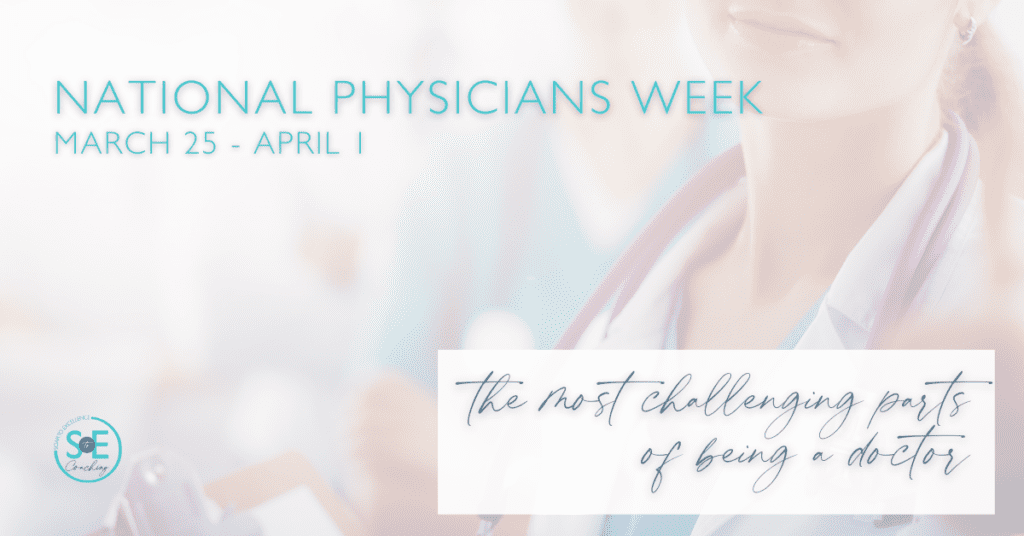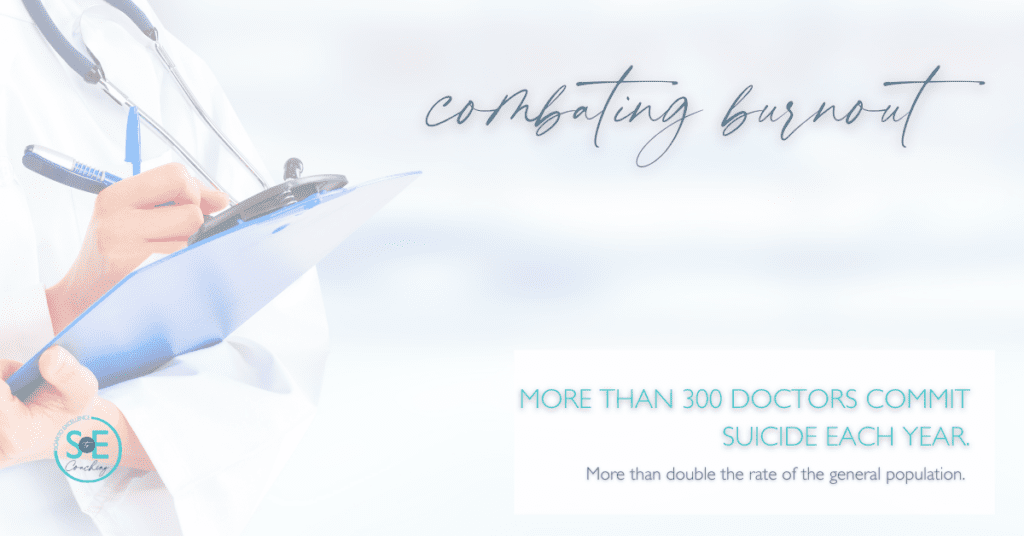
The Most Challenging Parts of Being a Doctor
Happy National Physicians Week to all of our amazing colleagues and friends! Not a day goes by that we don’t recognize your hard work, sacrifices, and dedication to the medical field.
There’s much to celebrate this year! As the national roll-out of the COVID-19 vaccine ensues, we are grateful to finally see some light at the end of the tunnel. We’ve come a long way from where we started, but the work is not done yet.
As we reflect on the achievements, it’s time we paid some long-overdue attention to the shortcomings of medicine, as well. From workplace toxicity, burnout, and moral injury, it’s time to acknowledge the challenges doctors face.
Getting into Residency.
Perhaps the biggest issue in medicine is the level of difficulty that comes with getting into a residency program. Residency programs are overwhelmed with applicants and don’t have enough space or funding to accommodate. Due to the high volume, applications with low test scores and international students may be electronically filtered out.
We’ve learned the hard way that passing Boards and often incurring $200,000 worth of student loan debt doesn’t guarantee the status and success we were promised. That means it’s up to us to CREATE the careers we want!
To get research experience for residency, many doctors are volunteering in local hospitals or traveling to underserved communities to provide medical assistance. Still, more than 10,000 of these doctors are chronically unplaced.
Some applicants have spent more than $30,000 on residency application fees. That’s on top of the colossal student loan debt. Pair that with being unemployed, and med students have every reason to be stressed out.
With all these hurdles, differentiating your residency application from competitors is crucial. Per Kaplan’s blog article, we recommend:
- Applying for away rotations
- Gaining research experience
- Becoming a leader in student organizations
- Pursuing a dual degree
- Becoming a medical volunteer
For more helpful tips to stand out in your interviews, check out these Do’s and Don’ts of Residency Interviewing. Designed to prepare you for all stages of the interview process, there’s no such thing as over-preparing.
Passing Boards.
You may be thinking… What residency program?? I haven’t even passed my Boards yet! Or maybe I still have to pass these Specialty Boards! If that’s you, stay focused. Passing boards is the gateway to a doctor’s highest level of compensation. So many of us struggle to get past this barrier. Failing the test flat out sucks—there’s no sugar-coating it.
The good news is, you are not alone. Thousands of doctors fail their boards each and every year. The shame that follows is intense and leaves us feeling frustrated and disappointed. Even our very own Dr. Toni® (among a long list of other smart and talented doctors) has experienced this.
Don’t beat yourself up. When we fail at anything, the key is to learn from our mistakes and persevere until we achieve the desired result. Soar to Excellence® Coaching can help prepare you for retaking your boards. Click here to check it out!

Combating Burnout.
Burnout and moral injury are major problems in the medical field. This is in part because doctors are burdened with administrative duties. The average physician works 51.4 hours a week. As many as 1 in 4 doctors report working 61-80 hours of the week.
During their shifts, doctors are asked to cram more and more patients into each day. Seeing that many people back-to-back is difficult, at best. It also doesn’t allow enough time to supply patients with the quality care or education they deserve.
On top of that, most medical professionals are drowning in paperwork and electronic medical records. Many doctors have reported that the pay just simply isn’t worth it. When you can’t even enjoy time away from work with your loved ones, what’s the point?
Moral injury is an occupational hazard of healthcare that has become a major conversation in recent years. Moral injury arises when you know what is best for your patients, but there are systemic barriers. Often, this is related to insurance or other business aspects outside of the physician’s control. Read examples of moral injury here.
Some physicians retire early or pursue other endeavors that are less stressful and more fulfilling. Those are the lucky ones. Others struggle with mental health, substance abuse, student loan debt, and suicidal thoughts.
In the United States of America, more than 300 doctors kill themselves each year. That’s more than double the rate of the general population.
The incentive to practice medicine is lower than ever before. So low, that there is a shortage of doctors that is worsening with upcoming generations. Last year, the Association of American Medical Colleges released a study stating the country would face a shortage of 54,100 to 139,000 physicians by 2033.
Signs of burnout in healthcare include sleep disturbance, cynicism, and reduced tolerance to patient contact. If you notice any of these signs, maybe it’s time to explore other options to cut back on work obligations. This can include:
- Taking time off
- Delegating tasks
- Moving to part-time
- Adjusting your workflow
- Cutting back on surgeries
- Stepping down from boards & committees
- Taking inventory of what’s important to you
- Optimizing your schedule and prioritizing personal time
Find the full list of job burnout symptoms, causes, and risk factors by learning more here.
Evaluating Your Job.
If you’re looking around wondering “Is this it?” then it’s time to take inventory of your work life. It’s never too late to explore ways to enhance your career or transition to something new. According to this Business Insider article, here are the top questions you should be asking yourself if you’re considering it:
- What are you passionate about? What are your skills?
- What is and isn’t working for you in your current career?
- Beyond your career, what is important in your life?
- What is your vision for your future, and what career will support you in manifesting that vision?
- What are the barriers to entry in your future career, and how can you work through them?
- Does your new career plan fit into your life’s purpose? What career will allow you to express your values?
It can be difficult for doctors to leave toxic environments, especially when they have to leave their longstanding patients. Being jobless after working in the field is panic-inducing for many physicians. After a certain amount of time without clinical work, new employers begin to ask if a physician’s training is up-to-date.
One would think that with plenty of patients to care for, hospitals would be fully staffed. Unfortunately, that is not the case. Most hospitals barely have enough physicians to cover the hours in a day, let alone when doctors themselves are sick or have an emergency. Of course, this only adds to more stress and exhaustion.
This makes taking inventory of your job all the more important. You deserve to feel supported and cared for no matter the circumstances. After all, if it isn’t Covid-19, it will always be something else. Evaluate whether your job is still a good fit on a regular basis. It’s a great mental health checkpoint and a chance to determine whether you’ve outgrown the workplace.

Build Your Power Team!
By age 55, nearly half of all physicians will be hit with a malpractice suit, which is why malpractice insurance is so expensive. Though it’s true that the majority of these suits are dismissed or ruled in favor of the physician, that’s after $30,000+ in defense fees and sky-high premiums.
Medical liability lawsuits are constantly looming over the heads of doctors. Even though they are extremely common, landing a suit can result in loss of employment and makes it difficult to get rehired. On top of that, malpractice insurance for these doctors becomes even more expensive.
Navigating road bumps related to legal matters and malpractice lawsuits can be challenging. That’s why it’s crucial to have a team of consultants and advisors. specializing in these areas. Don’t wait until you need it. Everyone needs a team of experts.That’s why we recommend keeping the following advisors in your circle:
- Coaches
- Bankers
- Accountants
- Insurance Brokers
- Physician Mentors
- Financial Advisors
- Business-Minded Colleagues
- Health Law & Estate Planning Attorneys
Remember, the physician’s perspective is not enough! You are the specialist in your field, and you need trusted professionals in areas where you are not the expert. These key contacts help to protect your assets, sanity and execute transitions more effectively for you and your family.
For more tips on building your Power Team (and avoid the Top Ten Mistakes physicians make with contracts), check out Dr. Bonnie Simpson Mason’s The Doctor’s Ultimate Guide to Contracts and Negotiation: Power Moves. As the ultimate playbook for physicians in ALL stages of their career, this book is a must-have manual for doctors everywhere.
Continuing the Conversation.
We’ve barely scratched the surface of the hurdles physicians face. To make matters worse, the pandemic has exponentially increased the severity of them. As we work toward controlling this virus, it’s important to respect front-line medical professionals by wearing masks and social distancing.
If you’re a physician who has been struggling, know that you are not alone. We see you, we hear you, and we hope you’ll allow us to help support you! Happy Physicians Week, rockstar!
